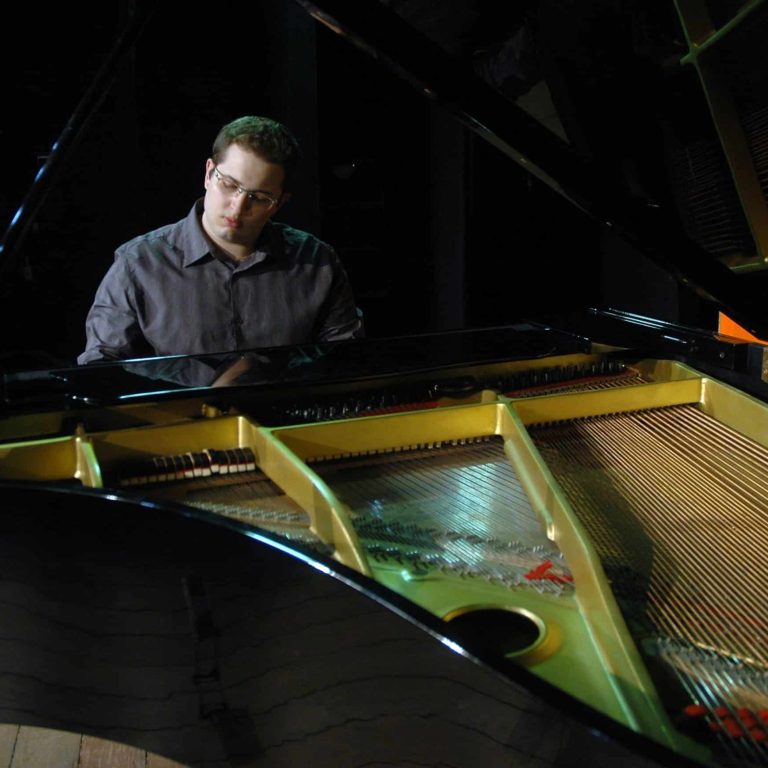
BM – State University of Minas Gerais
MM – Hartt School, University of Hartford
Industrial Engineering – Fedederal University of Minas Gerais
Brazilian-born pianist and tenor Igor Ferreira has a multifaceted career that has been presented in many different venues. He has been featured in the Brazilian TV show Segunda Musical (on TV ALMG) in the years of 2008, 2009 and 2011, being recorded live at the Teatro da Assembléia Legislativa de Minas Gerais. Also, he was the artist who gave the inaugural concert of the Centro Cultural de Eventos Dep. Nárcio Rodrigues, the main cultural center building of the city of Itapagipe/MG. The pianist was a featured performer at the 2017 Arte Livre Festival, at the Clube do Concerto series, at the Concertos de Outono in 2018 and most importantly, at the 6th Festival de Maio (2018), being invited to perform in a historical concert dedicated to one of the most important Brazilian composer: Edino Krieger. The composer was in the audience, as his 90th Birthday was being celebrated.
Mr. Ferreira is a Masters of Music Arts (MMA) program in Piano Performance, degree received by the University of Hartford under tutelage of Prof. Frederic Chiu and Prof. David Westfal. His thesis “Six Chants Polonaises de Chopin S.480 by Liszt: A distinguished case of transcribing a composer’s style” analyses Franz Liszt’s piano transcriptions of Frederic Chopin’s Polish songs, and how they showcase what Liszt understands as the main stylistic contributions of Chopin, as well as the technical implementation of them into these transcriptions. His academic life also includes two Bachelor’s degrees: one in Piano Performance from the State University of Minas Gerais (UEMG), under tutelage of Ms. Junia Canton, and another one in Industrial Engineering from the Federal University of Minas Gerais (UFMG).
As a lyrical tenor, Mr. Ferreira has performed with the Hartt Symphony Orchestra, conducted by Anthony Trecek-King and with the Manchester Symphony Orchestra and Chorale, conducted by Carolina Flores. He was a tenured member of the Coral Lírico de Minas Gerais (CLMG), which is the professional symphony/opera choir of the Brazilian state of Minas Gerais, housed in the Palácio das Artes alongside the state’s orchestra, the Orquestra Sinfônica de Minas Gerais (OSMG). He has taken part in many operatic super-productions such as Carmen, Lucia de Lammermoor, Porgy and Bess, La Traviata, Rigoletto, The Flying Dutchman, Norma, The Elixir of Love, Il Guarany and many more. He performed in the choir at the inaugural concert of the Sala Minas Gerais, one the most acoustic developed rooms of Latin America, that houses the Orquestra Filarmônica de Minas Gerais (OFMG). He was also part of A Cançāo das Iluminuras, a specialized early-music ensemble with a vast collection of early-music instruments. He was a student of Ms. Marisa Simões.
This diversity in formation has made Mr. Ferreira an accomplished teacher, who held a private piano studio for 15 years. Some of his students have been awarded in Brazil and internationally. Many of them were accepted in top-rated Brazilian universities, being placed first in some of the admission processes. As a member of the Suzuki Association of Americas, he has been certified in Suzuki Teacher Training with Prof. Sachiko Isihara. He served as faculty at the University of Hartford in which he held a Suzuki Piano studio.
He was the Piano Clinician of the 2022 The Hartt Suzuki Institute for the Summer, and, recently, he was the Piano Teacher of the Suzuki School Summer Camps in 2023 and 2024.
To study music, especially the piano, is to become a more complete human being. That is the reason I believe so eagerly in the importance of music to be considered one of the basic skills of a child. It is the only art that deals so directly and palpably with the rational and analytical aspects on one side, and with the phenomenon of emotion and expressiveness on the other. Music teaches invaluable values such as perseverance, discipline, deep listening (not just to sounds and music, but to others and yourself), courage, problem-solving, cultural diversity acquisition and empathy.
The Suzuki philosophy ensures that a child learns and understands the necessary skills to play music in a way that is personal and thorough. It allows the student to deal with matters that might otherwise be considered unattainable at a young age such as sound quality, refinement of performance, style and artistry. As a Suzuki teacher, I realize that by striving to pave the most thorough path for musicianship, the main benefit is not simply the ability to play an instrument with true quality (which does come, and is surely welcomed and celebrated), but the enormous transformation that the learning process brings to the child, to the entire family and, thus, to society.
We host events, performances, workshops, and more throughout the year. Check the calendar to see what's coming up this month.
We host events, performances, workshops, and more throughout the year. Check the calendar to see what's coming up this month.